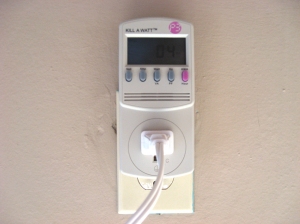The Regional Greenhouse Gas Initiative (RGGI) is the first mandatory, market-based effort in the United States to reduce greenhouse gas emissions. Ten Northeastern and Mid-Atlantic states haved capped and will reduce CO2 emissions from the [electric] power sector 10% by 2018.
States sell nearly all emission allowances through auctions and invest proceeds in consumer benefits: energy efficiency, renewable energy, and other clean energy technologies. RGGI will spur innovation in the clean energy economy and create green jobs in each state.
For some, C-tax is a four letter word
Science Daily has a nice summary of a recent research paper published in Psychological Science about people’s willingness to pay for higher environmental quality. A particularly well-known theory in this area is the environmental Kuznets curve, which relates increased wealth to increased acceptance of costs for a higher quality environment. These researchers instead looked at the acceptance of these costs across individuals of different political leanings.
For those of you who enjoy academic papers, or are otherwise interested in the nitty-gritty, you can read the paper itself at the principal author’s website.
Energy Savings Seminars Avaialble to MA Communities
 The Massachusetts Municipal Association (MMA) is offering free Home Energy Saving Seminars to communities across Massachusetts. The Massachusetts Municipal Association is a nonprofit, nonpartisan association that provides advocacy, training, publications, research and other services to Massachusetts cities and towns. If you are interested in hosting a workshop in your community schedule the workshop soon, as the program ends in March.
The Massachusetts Municipal Association (MMA) is offering free Home Energy Saving Seminars to communities across Massachusetts. The Massachusetts Municipal Association is a nonprofit, nonpartisan association that provides advocacy, training, publications, research and other services to Massachusetts cities and towns. If you are interested in hosting a workshop in your community schedule the workshop soon, as the program ends in March.
Through this free service offered by MMA, the Cambridge Energy Alliance hosted a Weatherizing Your Home for Ultimate Energy Savings event on January 12th, that brought together over 45 individuals wanting to learn how to reduce their energy use at home. Speaker Clark Goody from the Conservation Services provided detailed information on home energy audits, cost effective investments, and access to resources to help residents save energy and money.
The free energy seminar stresses the importance of reducing heat usage by providing do-it-yourself sealing techniques, tips on hiring a contractor for in-depth alterations, and resources for home audits and financing alterations. Program attendees learned about:
- Air sealing and insulation as the most cost-effective investment for reducing home energy costs
- Programmable thermostats, CFL’s, low-flow showerheads
- Rebates and grants to reduce the cost of home alterations and appliance purchases
- Energy Star ratings as an indicator of product energy efficiency
- MassSave home energy audits, enhanced audits, and the weatherization assistance programs
The Home Energy Savings Seminar is an excellent way for communities to connect residents to efficiency resources and programs. Communities can chose from a variety of workshops including:
___ “Intro to Home Energy Savings” provides simple steps to reducing the use
of electricity, water, and heat; do-it-yourself techniques for basic home sealing
and heating; resources for financing home audits and alterations.
___ “Home Energy Savings for Renters” provides tenant-specific information on
basic home energy savings.
___ “Home Energy Savings for Retirees” provides senior-specific information on
basic home energy savings.
___ “Weatherizing Your Home for Ultimate Savings” stresses the importance
of reducing heat usage by providing do-it-yourself sealing techniques; tips on
hiring a contractor for in-depth alterations; resources for home audits and
financing alterations.
To learn more about the program contact Alicia Hunt at energy@mma.org, 617-426-7272 ext. 280
Green Shelter Project Underway at Transition House
Press Release: Green Shelter Project Underway at Transition House
Cambridge, MA — Transition House, Cambridge’s nonprofit domestic violence prevention agency, is greening its Emergency Shelter. The 120-year-old building buzzed with activity on Sunday, January 10, as Transition House kicked its Green Shelter Project into high gear with a modern-day weatherization barn-raising in partnership with the Home Energy Efficiency Team (HEET), the Cambridge Energy Alliance and New Generation Energy. “We were excited to have so many skilled and enthusiastic volunteers join together to make the Shelter more energy efficient and more comfortable for the 100 people who live there each year,” relayed Risa Mednick, chair of the Transition House Board. “We’re connecting the dots between environmental sustainability, energy conservation and sustaining vital programs in an era when domestic violence is on the rise and the needs of survivors far outstrips available resources.” “Every dollar we save on utility expenses will be redirected toward strengthening services our community depends on,” says Mednick.
Over 40 volunteers worked nonstop in groups led by HEET trainers sealing drafty basement leaks, caulking windows, installing low flow faucets and shower heads, replacing incandescent light bulbs with energy efficient compact florescents (CFLs) and weather stripping doorways. Former Mayor and City Councilor Denise Simmons, Councilor Sam Seidel and Councilor and State Representative Tim Toomey lent a hand. Transition House board members and the Middle East restaurant provided food for hungry workers. HEET donated all supplies and training and the Cambridge Energy Alliance donated CFL bulbs.
“In a few hours, we swapped out 50 light bulbs in 15 rooms, caulked all the windows and doors, fitted sinks with new aerators, and sealed over 140 feet of band joists that were a major source of heat loss,” reported Audrey Schulman, HEET’s president. Based on before and after measurements, HEET estimates a reduction of over $600 per year on heat and electricity bills. “We look for ways an organization like Transition House or an individual in their own home can realize big savings with small changes, says Schulman. One example: simply replacing the old bulbs in exit signs that operate 24/7 with high efficiency LEDs will save Transition House over $100 per year.
Chuck Lewin, founder of New Generation Energy ducked below basement pipes and beams as he sealed up air leaks remarking, “Every small thing each of us did here will have a lasting impact for Transition House. The environmental benefit can multiply if everyone applies what they’ve learned to their own homes and apartments.” HEET trainer Lilah Glick, of the Cambridge Energy Alliance led the team replacing thermostats with instruction in Spanish and English and shared that “programmable thermostats are an inexpensive way to reduce energy consumption, typically saving the average home over $150 dollars a year.”
Introducing low income homeless women to new skills that might spark their interest in green jobs and training opportunities is another important goal of the Green Shelter Project; engaging them in energy saving strategies as a part of budgeting and money management is also key.
Next steps for the organization include: continuing work with HEET to train staff and clients on changing work and lifestyle behaviors to increase energy conservation and savings; collaborating with New Generation Energy and the Cambridge Energy Alliance to monitor utility consumption patterns and assess the efficacy of renewable energy systems for the Emergency Shelter; and a green kitchen renovation.
###
About Transition House: Transition House, a nonprofit organization in Cambridge, MA, works to break the cycle of domestic violence. Transition House offers a continuum of safe, supportive housing options for individuals and families escaping abuse as well as prevention education in school and community settings. Since 1975, Transition House has been a lifeline to thousands of families as they rebuild their lives and has educated tens of thousands of youth in Cambridge and Greater Boston. www.transitionhouse.org
Partners in this green initiative include: the Home Energy Efficiency Team (www.heetma.org), Cambridge Energy Alliance (www.cambridgeenergyalliance.org) and New Generation Energy (www.newgenerationenergy.org) respected organizations with a shared interest in engaging public awareness and increasing participation in conservation and energy efficiency initiatives.
Hot air
Back in July T. Boone Pickens announced a quartering of his mega-wind farm project. The project has essentially been scrapped due to continuing issues with access to transmission lines, as Mr. Pickens downplays wind in his wind+natural gas “plan.” The remaining order with GE has been halved to three hundred odd turbines, whose future home is expected to be relocated from the Texas panhandle to Canada or Montana. Continue reading
Tobacco powered trucks?
 On their face, biofuels seem like a pretty good idea: carbon dioxide and sunlight in, carbon dioxide and energy out. Certainly some hobbyists manage to recover waste grease for use in diesel engines, but commercially the field has been dominated by the fermentation of sugars from food crops into ethanol. Unfortunately, due to the large petro-chemical inputs often employed it is unclear whether the result is a net gain. In addition, much attention has been given to the competing interests of fuel vs. food (vs. land conservation).
On their face, biofuels seem like a pretty good idea: carbon dioxide and sunlight in, carbon dioxide and energy out. Certainly some hobbyists manage to recover waste grease for use in diesel engines, but commercially the field has been dominated by the fermentation of sugars from food crops into ethanol. Unfortunately, due to the large petro-chemical inputs often employed it is unclear whether the result is a net gain. In addition, much attention has been given to the competing interests of fuel vs. food (vs. land conservation).
There is hope that research into the production of cellulosic ethanol, or alcohol from plant fibers, could soon tip the balance decidedly in favor of biofuels. One could use agricultural waste or fast-growing special cover crops however, this material should arguably be composted back into the fields… But what if you could make use of existing knowledge and agricultural land; instead of converting forest into sugarcane fields, or farming prairie? Perhaps even provide a competing market for an otherwise dubious product? This may be possible if research into genetically modified tobacco proves to be fruitful. These plants do not contain pesticide-producing or herbicide-resistance genes. Instead, scientists are working on ways to make the leaves of the plant express existing genes and produce more oil for use in fuel production.
Fun with a Kill-A-Watt
 We finally got that Kill-A-Watt we’ve been thinking about, and we spent a good part of last weekend running around the house measuring the energy use of every single piece of electronic equipment we own. It was surprisingly fun. It was also a lot of numbers. (See below.) But we could draw a few conclusions from all of them: Continue reading
We finally got that Kill-A-Watt we’ve been thinking about, and we spent a good part of last weekend running around the house measuring the energy use of every single piece of electronic equipment we own. It was surprisingly fun. It was also a lot of numbers. (See below.) But we could draw a few conclusions from all of them: Continue reading
Clearing the Air
 From a record-breaking freeze threating an entire crop of citrus in Florida to significant snowfall in England, many are wondering just how “real” global warming actually is…considering how cold it’s been lately. To set the record straight, let’s begin by using the term “climate change” instead of “global warming.” While indeed the Earth’s core temperature is rising at an alarming rate, what that temperature rise actually does is shift the various ecosystem temperatures on Earth either up or down; it doesn’t necessarily mean temperatures will be high everywhere, but that the climate will, in fact, change drastically in one way or another. Some previous Ice Ages, for example, were triggered by changes in ocean currents and surface water temperature due to cold, fresh water from the melting polar ice caps disrupting major ocean currents. NASA highlights this important weather / climate distinction on their website. Please pass this information along to any skeptics who might need additional information. If we’re going to reverse climate change on a global scale, one of the first critical steps is education.
From a record-breaking freeze threating an entire crop of citrus in Florida to significant snowfall in England, many are wondering just how “real” global warming actually is…considering how cold it’s been lately. To set the record straight, let’s begin by using the term “climate change” instead of “global warming.” While indeed the Earth’s core temperature is rising at an alarming rate, what that temperature rise actually does is shift the various ecosystem temperatures on Earth either up or down; it doesn’t necessarily mean temperatures will be high everywhere, but that the climate will, in fact, change drastically in one way or another. Some previous Ice Ages, for example, were triggered by changes in ocean currents and surface water temperature due to cold, fresh water from the melting polar ice caps disrupting major ocean currents. NASA highlights this important weather / climate distinction on their website. Please pass this information along to any skeptics who might need additional information. If we’re going to reverse climate change on a global scale, one of the first critical steps is education.
Super (secret) greenhouse gases
 Environmentalists had great expectations for “Hopenhagen,” and the talks received a lot of press long before they even rolled around. Yet another international meeting one month earlier was arguably of equal importance, foreshadowed the events in Denmark, and received almost no attention1: the annual meeting of Montreal Protocol signatories. Read Solve Climate founder David Sassoon’s write-up.
Environmentalists had great expectations for “Hopenhagen,” and the talks received a lot of press long before they even rolled around. Yet another international meeting one month earlier was arguably of equal importance, foreshadowed the events in Denmark, and received almost no attention1: the annual meeting of Montreal Protocol signatories. Read Solve Climate founder David Sassoon’s write-up.
1. None of the few dozen stories on Google News which mention the Montreal Protocol last year preceded the event. Most are specialist coverage of its impacts on various industries or countries still using CFCs, and a few others comment on Copenhagen by contrasting the successful effort to combat ozone depletion versus the relative lack of progress on global warming.
MA gets gubernatorial group’s guidance on retrofits
The National Governors Association announced yesterday that it would be providing support for the development of “policy academies” focusing on building retrofits in six states, including Massachusetts.
A Policy Academy is a highly interactive team-based process for helping a select number of states develop and implement an action plan to address a complex public policy issue. Participating states receive guidance and technical assistance from NGA Center staff and faculty experts and consultants from the private sector, research organizations, academia and the federal government.




